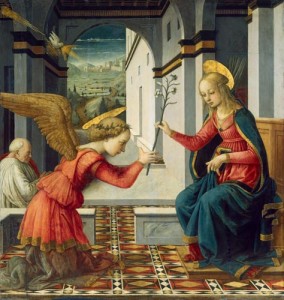The Wise Virgin
 Who is she that comes forth like the dawn, fair as the moon, bright as the sun, terrible as an army set in battle array? (Song of Solomon 6:10)
Who is she that comes forth like the dawn, fair as the moon, bright as the sun, terrible as an army set in battle array? (Song of Solomon 6:10)
Does that Scripture really refer to the sweet mother in our crèche? The adoring mother, demurely gazing at the Babe, surrounded by inquisitive shepherds and under the watchful eye of silent Joseph? What are we missing? We need not choose between seeing Mary as a docile maiden or the most formidable enemy of the ravager of souls; rather, we must recognize that the very docility that allows Mary to focus on her Lord is also the virtue that allowed her to be filled with God’s own strength—and which would one day reveal her to be Virgin Most Powerful and Tower of Ivory.
As silent as Mary seems to be in Holy Scripture, there is just enough information to assemble a heart-warming catechesis on authentic discipleship and the strength of God’s own familial bonds. Mary, of course, was not only the Mother of God but His most perfect disciple. This is what Our Lord meant when he asked, “‘Who are my mother and [my] brothers? Whoever does the will of God is my brother and sister and mother’” (Mark 3: 33, 35). Mary’s “yes” initially sealed her vocation as disciple, and only within that calling was she mother—but it stands to reason that these two dimensions are inseparable.
How do we really know what transpired? The remarkable account of the Annunciation had to have been told by Mary after Jesus’ resurrection. She must have been asked by those around her, whereupon the whole saga spilled out: the recollected quiet, the celestial visitor, the exchange, and the Incarnation around which salvation history revolves.
I confess I was always confused about why her question (“How can this be…?”) was considered appropriate and Zechariah’s (“How shall I know this…?”) was considered impertinent. The answer she received amplified our understanding of God’s plan; his answer was to be struck dumb. The way to look at this encounter, I’ve learned in the writings of Jacob of Serug, is not to compare Mary with her cousin, but to compare Mary with Eve. When Eve was approached by an angel, she asked no questions. Alas, she simply took him at face value and acted on his suggestion. Mary, who had to know about the previous ruinous encounter, exercised prudence before accepting the message.
Not only did Mary’s prudence spare her from a possibly disastrous choice, but the answer she elicited from the angel has since been foundational to our faith. She pondered the message in her heart, kept the information in her mind over the coming decades, and meditated on how those events related to the promises of God. When the time was right, she shared what was appropriate with the apostles. What we know of the Christmas story, no doubt, came to life through the quiet words of Our Lady as she told the story of God stooping to earth, entrusting himself to her care and that of her betrothed—who had shared with her his own dreams so long ago.
As with any family, the stories spread and were treasured, not only providing details about the human dimension of the God-man, but providing essential details about the Trinity, the Incarnation, and our Redemption. In that regard, we discover that that quiet maiden was not only the perfect vessel for the Holy One of Israel, but that she reigns with him now and will use her motherly influence to bring all her children home. That is the wonder of that sweet mother in the crèche who remains the refuge of sinners. Virgin most prudent, pray for us!

